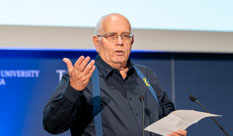More:
News & Stories
Food Security During COVID 19 major focus of online international conference
A joint conference between the Holon Institute of Technology (HIT) and University of Samarkand took place online for 2 days between October 16-17 to discuss “Food Security: National and Global Challenges”. The conference theme reflects the Government of Uzbekistan’s decision to invest resources in the digitization of agriculture. This is the fifth conference that HIT and the University of Samarkand have held, but the first among them to deal entirely with the subject of agricultural technology. The institutions share a joint program in mathematics and technology management and ongoing STEM collaborations.


The conference had several objectives. It was designed to help delineate national and international measures to ensure food security during the COVID-19 pandemic; establish collaborations and implement basic research on food security, particularly in Uzbekistan, where agriculture plays a huge role in its economy. Among the issues being discussed: Analysis of the current state of growing, storing, processing and preserving the nutritional values of agricultural products; use of modern technology to restore national nutritional traditions in order to ensure a safe diet; implementation of modern biotech solutions in ensuring food security; development of technologies of growth and protection against pests; mitigation of climate change and strengthening food security through the use of natural resources to ensure sustainable economic development in arid regions; preparing textbooks, teaching and methodology guides and more.
For HIT, this is a scientific area of research which has developed greatly over the last few years. Dr. Eyal Brill from the Faculty of Technology Management, together with colleagues from the Volcani Institute, won a NIS 1.2 million grant from the Israeli Ministry of Science to conduct research on: "Use of big data for the purpose of real-time optimization of growth functions”. Dr Brill and team’s research would adapt the amount of water each crop needs for optimal growth, while taking into account environmental conditions, the seasons, actual growth rate and additional parameters.
Furthermore, just recently, HIT launched an Automation and Control laboratory in collaboration with “Shaham Mekorot”, Topco and General Engineers - the first of its kind in Israel - which will predict errors in the water sector. The laboratory, part of HIT’s Smart City initiatives, includes advanced equipment and 'supercomputers' which will be able to save hundreds of thousands of dollars for the water economy.
Dr. Eyal Brill, Head of the Undergraduate Program in the Faculty of Technology Management, presented his research on: "Integrating Replica Data in Precise Agriculture"
Dr. Josef Tanny, Senior Lecturer in the Faculty of Technology Management, spoke on: "Efficient use of water in growing peppers in greenhouses in arid areas"
Mr. Mark Israel, Manager, HIT Center for Industry Projects and Head of the GIS Lab, spoke on: “GIS Applications Location-Based Analysis and Use”
Boaz Kiper CTO Shaham Mekorot spoke on: "Innovative water technologies"
Mr. Erez Fayette of Agrinoz Ltd. presented examples from his company's activities in the field of soil improvement and monitoring, with advanced technological means of plant growth and their physiological cycle.
The opening ceremony was attended by: The Governor of Samarkand, Mr. Erkinjon Turdimov, Rector of the University of Samarkand, Prof. Rustam Khalmuradov, Israeli Ambassador to Uzbekistan, Ms. Zehavit Ben Hillel, subregions coordinator for Central Asia of FAO Food and Agriculture organization of the UN - Mr. Virel Gutzu, President of HIT, Prof. Eduard Yakubov, Head of the Regional office for Central Asia and Caucasus ICBA – Uzbekistan Dr Aziz Karimov.
HIT’s participation in the conference firmly cements its academic and technological pre-eminence in the field of agri-tech and strengthens international collaborations with countries and institutions from Euro-Asia, which has been a central focus of HIT’s international efforts over the past five years.
HIT President Prof. Eduard Yakubov stated in his Opening Remarks: "The issue of food security is of great importance to every country, and especially to those with a large population growth rate. This issue draws on HIT’s advanced capabilities in agricultural technology and requires in-depth knowledge in the areas of GIS, complex irrigation systems, resource management, and additional areas of expertise. I sincerely hope to expand HIT’s collaborations with the new Faculty of Agricultural Technologies established in Samarkand”.
A number of operative conclusions for further actions came out of the conference. A roadmap is being prepared by Dr. Brill and Prof. Tannay together with their colleagues at the Volcani Institute and the SSU to advance a project on data storage based on satellite imaging, which would positively impact on the efficiency of electricity, water and financial resources; to develop student projects which are relevant to the agricultural technological needs of Uzkekistan with future participants in the HIT-University of Samarkand joint program, in cooperation with Shaham-Mekorot and Agrinoz, and other relevant companies collaborating with HIT; to develop short term and full academic courses based on the academic needs of SSU; and finally, to examine the feasibility of organizing a short course on GIS at the governmental and university level in order to help Uzbekistan develop their cadaster and land digitation agenda.
Posted:16.10.20
- News & Events
New Collaboration with Sheba Medical Center will qualify nurses to work in a digital environment.
Collaboration between HIT Holon Institute of Technology, the teaching authority of the Sheba Medical Center, and the Sheba-BEYOND virtual hospital will allow training nurses in Israel and around the world to work in a digital...



 Additional programs
Additional programs
